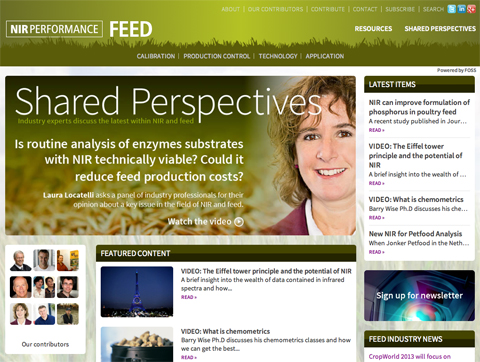
A new thought leadership platform encouraging stakeholder engagement and subject matter expertise has been launched by a global B2B technology company. Continue reading

A new thought leadership platform encouraging stakeholder engagement and subject matter expertise has been launched by a global B2B technology company. Continue reading

Our team spends a lot of time discussing business cases – real business cases, not “feel good” benefit-based stuff, but the ones with numbers on them. We’re keen to work out, for each of the customers or prospects we speak to, where revenue can be generated and/or savings can be made by putting knowledge-sharing campaign platforms in place.
At the center of it all is a concept we call “Return on Know-how” (ROK). OMG, you may be thinking, another word dreamed up by marketers. And that’s what it is, for sure. But there’s a real point to it, too – and it’s a goodie: What potential gains or savings are hidden in the know-how of your subject matter experts? What can be done to unlock this potential? Continue reading

Let’s face it. So much of what goes for B2B marketing is ghastly boring. How many variations of lower cost, higher efficiency, longer lasting, better ROI, etc. have we already seen? Buyers will often take these messages for granted, so just stating and repeating them has little or no impact.
Human beings are emotional beings – even when they’re at work, and there are many studies that show decision making (even for the most rational people including the people who might be interested in your device, substance, software, or whatever it is you manufacture) is heavily influenced by emotional incentive. Continue reading
TBKConsult CEO Hans Peter Bech is someone who likes to be pretty direct. Describing himself as an “international software business development evangelist” (which is quite a mouthful) his blog posts expose quite a few home truths about the business consulting industry of which he is a part. For example, I particularly like his answer to the question: “Will the engagement of management consultants improve the probability of success?“. He writes: ““I don’t know. As an independent management consultant I can only answer for myself. Call my other clients and ask them why they engaged me and what they achieved.” The words “I don’t know” really work for me. People should say them more often than they do in the world of business. Continue reading

While preparing the annual report of a global manufacturer of industrial products recently, it struck me what an ideal channel the annual reports are for establishing thought leadership. But it seems that many companies lock themselves into a standard formula that is all about reporting from the perspective of the company – like a true propaganda Voice of Company channel. It’s easy to miss the opportunity to truly engage stakeholders with content that is relevant and interesting to them. Continue reading
In this new world of straight-up, transparent, credible interactions with the company’s audiences, the “truth” is playing an increasingly important role. The trend is driven partly by the fact that attitudes are hardening toward corporate lies or other malpractices—just witness the number of whistle-blower programs that are being put in place across industries to enable employees to keep their employers and colleagues on the straight and narrow. In marketing contexts, easier access to essential truths about products and services from a customer experience perspective has started to make propaganda and/or outright fibs stand out like a sore thumb. Continue reading
Yesterday I received an email from a well-respected executive in a financial services company who had read “The Death of Propaganda – B2B Buyer Behavior Has Changed. Now it’s Your Turn.”, co-authored by me, David Hoskin and Michael Best.
The executive explained that the book’s message had made quite an impression on him, which naturally, was great to hear. And he wanted to discuss the ideas further, which is something any author is keen to do. But his message left me with a problem. You see, he had seen a definite need to reduce the amount of propaganda in his (otherwise successful) company’s marketing approach. And, once I had visited the company’s site, I was in agreement. Here’s my problem: the company’s website is the perfect, the penultimate example of full-on corporate propaganda that I have long been seeking, and I feel myself wanting to plaster it all over every presentation I give – and this blog – as a warning to others on a similar path.
However, since the executive is now in dialog with me about the problem, I can only limit myself to sharing some of the priceless strings of pure propaganda that follow…
Good stuff, don’t you think? In their defense, the company does also provide customer testimonials on its site – with names of the company and contact person. The difficulty with these is that they are all highly positive, lacking the rounded opinion (the good and the not so good) that improves the credibility of each testimonial.
To illustrate my point, imagine you are searching Travel.com for a hotel for a two-day visit to Chicago. You’re reading the customer reviews, of course (Voice of Customer), and you subject each one to a credibility test – is this review for real or is it an orchestrated litany of lies produced by the hotel itself or its agency? Chances are, you’ll trust reviews that mention negative experiences as well as positive ones. And you’ll feel confident in choosing a hotel when you can see that the overall experience of each customer has been a good one.
Crafting such testimonials in a business world requires skilled hands, of course, and is best left to experienced communicators (even when the basic content is genuinely customer-generated, which we always recommend), but the point is clear: polished propaganda belongs firmly in the last millenium.
One of the largest gaps between what today’s new breed of B2B buyer wants and the way most B2B companies communicate concerns sheer credibility. You see, it’s easy to compare the communications efforts of today’s B2B marketers to what I like to call “propaganda” – carefully crafted messages designed to persuade the masses using superlatives like “advanced”, “state-of-the-art”, “cutting edge” and the like.
At times, I am reminded of the efforts of the Catholic church when challenged by the Reformation, the proponents of which railed against the overly ornate decoration of huge cathedrals covered in gold and fine art, all designed to impress the ‘buyer’. Instead of trying to change the product to adapt to a new audience that had become increasingly unhappy with the funds they saw being spent by religious leaders, the church turned up the power, deploying even more decoration and riches in the hope that this would retain their followers.
At the risk of cheapening the lessons learned from history, I can’t help thinking that today’s B2B buying environment is comparable to those distant times. Luther and friends are out there searching the Internet, practicing direct and honest peer-to-peer communications, relying on the judgement of people like themselves rather than the propaganda disseminated by company websites and marketing collateral.
Eventually, the Reformation gave rise to a whole new way of reaching and persuading Christian audiences – even the Catholic church has had to follow suit. While I was born some years after the Reformation, I can clearly remember my own Catholic upbringing in a church that moved from heavily ritualized masses in Latin to a rock band-driven Sunday morning jam session in the space of just ten years.
Get ready to rock.

B2B buyers have changed their information-gathering, evaluation and purchasing habits – and B2B marketers and corporate communicators need to adapt their own approaches to suit.
In the good old days, a company salesperson would typically be involved with the buying process from beginning to end. That made them the main source of information about the company and its products. And they knew where the prospective buyer was in the process at any time – and were able to directly influence the progress of the deal. But things have changed. Continue reading